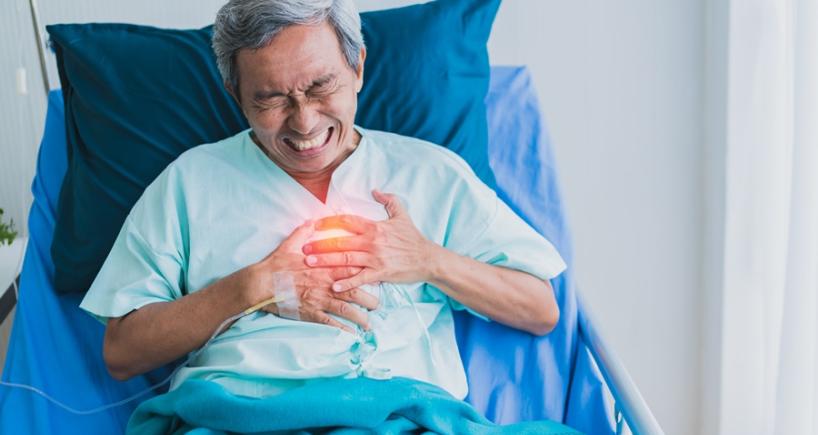
Cardiac Emergencies: Types, Cause, Symptoms, and Treatment
Introduction
Cardiac emergencies are serious medical situations that occur when there is a sudden disruption in the normal functioning of the heart. These emergencies can range from a myocardial infarction to sudden cardiac arrest, and they require immediate medical attention to prevent further complications. Identifying the symptoms of a cardiac emergency is crucial for timely intervention. By being aware of the signs and having knowledge of first aid techniques, one can save a person’s life. This blog will discuss the common signs of cardiac emergencies, the first aid techniques that can be applied to provide immediate assistance, and the importance of timely treatment.
Recognizing Different Cardiovascular Emergencies
- Cardiac Arrest: It is characterized by unconsciousness, loss of pulse, and collapse. It requires immediate medical attention to improve the chances of survival.
- Stroke: It is another typical cardiovascular emergency, presenting distinct warning signs such as facial drooping, arm weakness, and slurred speech.
- Hypertensive Emergencies: It is characterized by a significant elevation in blood pressure leading to end-organ damage, requiring prompt medical intervention to prevent further complications.
- Acute Decompensated Heart Failure: It is a critical cardiac emergency characterized by a sudden worsening of the symptoms of heart failure, requiring immediate medical intervention for stabilization and treatment.
Symptoms
Recognizing the signs and symptoms of cardiac emergencies is paramount, as it enables prompt intervention. Here are some common indicators:
- Chest Discomfort: This is frequently the characteristic indication of a heart attack. The feeling might range from slight unease to extreme pressure or agony in the chest that might circulate to the neck, jaw, and arms.
- Shortness of Breath: Difficulty breathing, particularly when accompanied by chest pain, can indicate a cardiac event. It may occur with or without chest pain and can worsen with exertion.
- Nausea and Vomiting: Feeling nausea or vomiting, particularly with other symptoms like chest pain, may indicate a heart problem.
- Sweating: Profuse sweating, often characterized as having cold and clammy skin, might occur during a cardiac emergency.
- Lightheadedness or Dizziness: Feeling faint or dizzy or experiencing lightheadedness might precede a cardiac event or co-occur with it.
- Fatigue: Unusual fatigue, weakness, or a feeling of impending doom can sometimes be early warning signs of a cardiac issue.
- Irregular Heartbeat: Palpitations, or the sensation of irregular, fast, or pounding heartbeats, may occur during a cardiac emergency.
First Aid Techniques
Act swiftly and confidently when confronted with a suspected cardiac emergency. Here are some essential first-aid techniques:
- Call for Emergency Assistance: In any cardiac emergency, the initial action is to call emergency services immediately. Ensure the patient doesn’t become overheated (avoid excess blankets) and transport them promptly to a facility equipped for cardiac care, ideally with cardiac catheterization capabilities.
- Check for Responsiveness: If one encounters someone who appears to be experiencing a cardiac emergency, gently shake or tap them and ask loudly if they’re okay.
- Perform Cardiopulmonary Resuscitation (CPR): If the person is unresponsive and not breathing normally, initiate CPR. Begin with chest compressions, aiming for a rate of approximately 100 to 120 compressions per minute. Combine this with rescue breaths, giving two breaths after every 30 compressions.
- Administer Aspirin: If the individual is conscious and capable of swallowing, and a heart attack is suspected, administer aspirin (preferably chewed) to prevent blood clotting.
- Automated External Defibrillator (AED): If an AED is accessible, adhere to its guidelines. AEDs have the capability to examine heart patterns and administer an electrical jolt to reinstate a regular heart rhythm if needed.
- Stay Calm and Reassure: During a cardiac emergency, staying calm and reassuring the affected individual is vital.
Causes of Cardiac Emergencies
- Stress
- Food with high cholesterol and fat content
- Sedentary lifestyle
- Type I and Type 2 Diabetes
- Obesity
- Family history of heart attack or heart diseases
- Low magnesium or potassium
- Hypertension
Diagnosis
Cardiac emergencies, often occurring without warning, present telltale signs such as unconsciousness, absence of breathing, and lack of pulse. Diagnosis, typically post-incident, includes:
- Physical examination and medical history review
- Blood tests, cardiac monitoring, imaging, genetic testing, cardiac catheterization, and electrophysiology studies
Prompt medical attention and comprehensive evaluation are crucial for post-cardiac arrest to devise effective treatment strategies and minimize the risk of complications or mortality.
Treatment
- Immediate CPR: Initiation of CPR is crucial to sustain blood circulation and oxygen delivery to vital organs, particularly the brain, until further interventions can be administered.
- Defibrillation: A defibrillator aims to restore the heart’s normal rhythm by delivering controlled electric shocks, especially in ventricular fibrillation or pulseless ventricular tachycardia.
- Medications: Anti-arrhythmic drugs, beta-blockers, and ACE inhibitors may be prescribed to stabilize heart rhythm and manage underlying cardiac conditions.
- Surgical Interventions: Procedures such as implantation of cardioverter-defibrillators (ICDs), coronary angioplasty with stent placement, coronary artery bypass surgery, radiofrequency catheter ablation, and corrective heart surgeries address structural and electrical abnormalities, aiming to restore cardiac function and prevent future emergencies.
These interventions work together to save lives, minimize complications, and improve overall outcomes in cardiac emergencies.
Prevention and Lifestyle Modification
- Quit smoking and limit alcohol consumption.
- Opt for a diet abundant in vegetables, fruits, and whole grains while minimizing intake of high-carbohydrate foods.
- Manage cholesterol, blood pressure, and diabetes.
- Engage in physical activity. Stay active. Maintain a healthy weight.
- Sleep for at least 7–9 hours each night.
- Practice relaxation techniques. Spend time with friends and family.
- Attend medical appointments for monitoring and management.
Timely treatment in cardiac emergencies is paramount. Swift intervention preserves heart muscle, enhances survival rates, prevents complications like heart failure and arrhythmias, and promotes faster recovery. Every minute matters, as delays can exacerbate damage and jeopardize outcomes, underscoring the critical importance of immediate medical assistance.



















